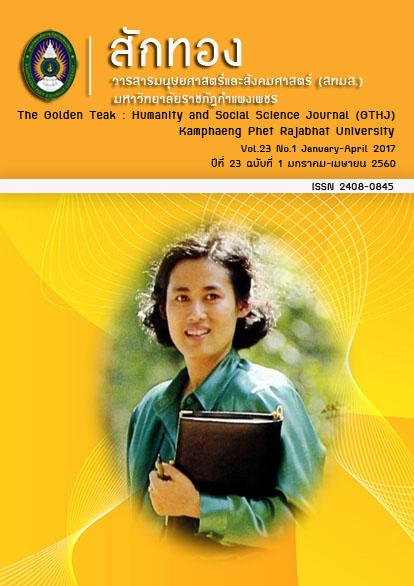การพัฒนารูปแบบการสอนแบบเน้นประสบการณ์ เพื่อส่งเสริมทักษะชีวิต สำหรับนักศึกษาครู มหาวิทยาลัยราชภัฏ
Main Article Content
Abstract
บทคัดย่อ
การวิจัยครั้งนี้มีจุดมุ่งหมายเพื่อ 1. สร้างและตรวจสอบคุณภาพของรูปแบบการสอน 2. ทดลองใช้และศึกษาผลการใช้รูปแบบการสอน 3. ประเมินความพึงพอใจของนักศึกษาครูที่มีต่อรูปแบบการสอน กลุ่มตัวอย่างที่ใช้ในการวิจัย ได้แก่ นักศึกษาครู โปรแกรมวิชาการศึกษาปฐมวัย คณะครุศาสตร์ มหาวิทยาลัยราชภัฏกำแพงเพชร โดยใช้วิธีการสุ่มตัวอย่างแบบง่าย (Simple Random Sampling) เครื่องมือที่ใช้ในการวิจัย ได้แก่ 1) รูปแบบการสอน 2) คู่มือการใช้รูปแบบการสอน 3) แบบวัดทักษะชีวิต สำหรับนักศึกษาครู 4) แบบประเมินความพึงพอใจการใช้รูปแบบการสอน 5) แบบสัมภาษณ์ แบบแผนการวิจัยเป็นการวิจัยแบบกลุ่มเดียวทดสอบก่อนและหลังทดลอง (One Group Pretest - Posttest Design) ผลการวิจัย พบว่า 1) รูปแบบการสอนฯ มีองค์ประกอบ 5 องค์ประกอบหลัก คือ หลักการ วัตถุประสงค์ เนื้อหา กิจกรรมการเรียนการสอน และการวัดผลประเมินผล ตามรูปแบบการสอนแบบเน้นประสบการณ์ เพื่อส่งเสริมทักษะชีวิตสำหรับนักศึกษาครู แบบ ARTP Model 4 ขั้นตอน ประกอบด้วย ขั้นที่ 1 ตระหนักประสบการณ์ (Alerting) ขั้นที่ 2 ขั้นร่วมสะท้อนคิด (Reflection) ขั้นที่ 3 ขั้นสร้างความคิดรวบยอด (Transfer) ขั้นที่ 4 ขั้นปฏิบัติเรียนรู้ (Practicing) และการวัดและประเมินผล 2) ผลการศึกษาทักษะชีวิต สำหรับนักศึกษาครู พบว่า นักศึกษาครูที่ได้รับการพัฒนาตามรูปแบบการสอนหลังการสอนทักษะชีวิต สูงกว่าก่อนการสอนทักษะชีวิต อย่างมีนัยสำคัญทางสถิติที่ระดับ .01 3) ผลการประเมินความพึงพอใจของนักศึกษาครูที่มีต่อรูปแบบการสอนฯ หลังจากดำเนินการจัดการเรียนการสอนตามรูปแบบการสอน พบว่า นักศึกษาครูมีระดับความพึงพอใจอยู่ในระดับมากที่สุด
The Development an Instructional Model by Using Experiential Learning
Enhancing Life Skills for Student Teachers in Rajabhat University
ABSTRACT
The purpose of this study was to Development an Instructional Model by Using Experiential Learning for Enhancing Life Skills for Student teachers in Rajabhat University. The study had four objectives : (1) a construction and develop research instruments for the instructional model; (2) an experiment on the instructional model; and (3) To measure student teachers satisfactory evaluation toward on the instructional model. Samples were student teachers in early childhood education program, Faculty of Education, Kamphaengphet Rajabhat University. Sample groups were selected by Simple Random Sampling. Instrument used in this study was the Instructional Model by Using Experiential Learning Enhancing Life Skills for Student teachers in Rajabhat University. The experimental model of the same group one Group Pretest - Posttest Design and analyzed by t-test. The findings were as follows: 1) The Instructional Model consisted of five components: (1) rationale; (2) objectives; 3) contents; (4) teaching steps by Using Experiential Learning, ARTP Model 4 steps: Alerting, Reflection, Transfer and Practicing; (5) measurement and evaluation. 2) The finding revealed that the post-test average scores after finished teaching of Life Skills for Student teachers were statistical significantly higher than pre-test scores at 0.01 statistical level. 3) Student teachers were satisfied with the Instructional Model at the “Highest” level.
Article Details
บทความที่ได้รับการตีพิมพ์เป็นลิขสิทธิ์ของวารสาร สักทอง : วารสารมนุษยศาสตร์และสังคมศาสตร์ สถาบันวิจัยและพัฒนา มหาวิทยาลับราชภัฏกำแพงเพชร
ข้อคิดเห็นใดๆ ที่ปรากฎในวารสารเป็นวรรณกรรมของผู้เขียนโดยเฉพาะ ซึ่งมหาวิทยาลัยราชภัฏกำแพงเพชรและบรรณาธิการไม่จำเป็นต้องเห็นด้วย


